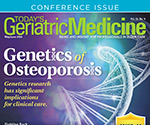 |
Patients requiring use of mechanical ventilators have difficulty communicating—a problem that’s made worse by the fact that patients affected by coronavirus likely do not have family members present to advocate for them. According to the American Speech-Language-Hearing Association, augmentative and alternative communication, which “includes the use of gestures, picture and word boards, and messages on computers or phones,” has an important role to play in helping patients with COVID-19 communicate more effectively with providers about their conditions and their desires.
In addition to reading our e-newsletter, be sure to visit Today’s Geriatric Medicine’s website at www.TodaysGeriatricMedicine.com, where you’ll find news and information that’s relevant and reliable. We welcome your feedback at TGMeditor@gvpub.com. Follow Today’s Geriatric Medicine on Facebook and Twitter, too.
— Kate Jackson, editor |
 |
 |
New Methods of Communication Needed During COVID-19 Crisis
Augmentative and alternative communication (AAC) can play an important role helping patients with COVID-19 communicate their condition and wishes with their medical teams. AAC includes the use of gestures, picture and word boards, and messages on computers or phones to help people communicate more effectively. The need for AAC is heightened by the fact that patients in acute care may not have loved ones around who would otherwise advocate for their care.
Many patients with COVID-19 in serious condition require a mechanical ventilator to help them breathe while in acute care. Although this is intended to be a life-saving measure, ventilator usage can result in complications—short and long term. This includes a person’s ability to speak, something that can have serious repercussions if not appropriately addressed, according to the American Speech-Language-Hearing Association (ASHA).
“It is essential that everyone have the ability to communicate at all times—and be provided an alternative method of communication if they cannot use speech,” says Theresa Rodgers, MA, CCC-SLP, 2020 ASHA president. “Not only do people deserve to have their basic needs met, such as to communicate that they are in pain or request that a loved one is called, but patients may be more likely to have a serious adverse medical event if they cannot communicate with their health care providers.”
Full story » |
 |
 |
Genetics of Osteoporosis
Research into the genetic factors that influence osteoporosis has significant implications for clinical care, from predicting risk to improving treatment. Read more »
Fighting Back
Patients are boxing to put Parkinson’s disease up against the ropes. Read more »
The Coronavirus: Information and Resources
A sampling of sources of information and resources for health care providers during the COVID-19 outbreak. Read more » |
 |
 |
A New Look and Name for Thick-It
A dysphagia nutrition solution product has a new name and new packaging to help distinguish the brand’s starch-based products from its gum-based products. Thick-It brand’s AquaCareH20 line of prethickened beverages, now called Clear Advantage Ready-to-Drink Beverages, is made with pure Artesian mineral water, thickened with xanthan gum, and available in a variety of flavors and in IDDSI Level 2 and IDDSI Level 3 consistencies. In addition, Thick-It Original Food & Beverage Thickener, used to thicken hot and cold beverages and puréed foods to desired consistency without affecting flavor, is now available in new stick packaging in mildly and moderately thick consistencies. Learn more »
Wearable Technology Allows Physical Therapy While Reducing Exposure to COVID-19
StepRite, from MedHab LLC, allows physicians and therapists to provide physical therapy and monitor patients remotely and securely, reducing the risk of exposure to COVID-19 and other infectious agents. The wearable device measures gait, range of motion, force distribution, and oxygen saturation. Learn more » |
 |
 |
Have a product or service you want to market to geriatricians, other physicians and the geriatric care team of professionals who treat aging patients? Are you a recruiter looking to fill the many geriatric professional openings within a facility, physician practice, or academic institution? Then utilize the reach of Today's Geriatric Medicine to accomplish your marketing goals and fill any open positions.
Coming up in our July/August issue is our Nutrition and Diabetes Resource Guide. Email a sales representative to be part of this unique advertising opportunity.
A resource for professionals looking for new opportunities, as well as those physicians just curious to see what's out there, our Physician Recruitment Center gives physician recruiters a powerful tool to fill partnership opportunities, academic appointments, and hospital staff positions. To support your product marketing or recruiting needs, e-mail our experienced account executives today at sales@gvpub.com for more information or call 800-278-4400!
|
 |
|
|
 |
|
|
 |
 |
COVID-19 Vaccine Development
Researchers at two Harvard-affiliated hospitals are leveraging an existing gene therapy method to develop a COVID-19 vaccination that may be ready for human testing in late 2020, according to The New York Times. The DNA is introduced into a patient’s cells via a vector to instruct cells to create an immune stimulating coronavirus protein.
How the Brain Organizes Memories
Scientists have captured evidence that the brain replays memories as we sleep. While the goal of the research is to restore communication and control to individuals with severe motor disabilities, it has widespread implications. Published in Cell Reports, the study, according to Newsweek, may contribute to the development of treatments for diseases that involve memory deterioration, such as Alzheimer’s disease.
How the Pandemic Affects Home Care
What will the future of home care be in the age of COVID-19? Patients, understandably, are frightened to have home care workers enter their homes, yet they desperately need their services. The Washington Post reports on the dilemma.
Cancer Testing: A Casualty of the Pandemic
Patients want to postpone medical appointments to avoid potential exposure to the coronavirus, and some health care providers are putting certain types of routine screening, such as mammography and colonoscopy, on hold. The risks for people with existing cancers could be significant. The Philadelphia Inquirer reports on the repercussions of deferred screening procedures. |
 |
|
